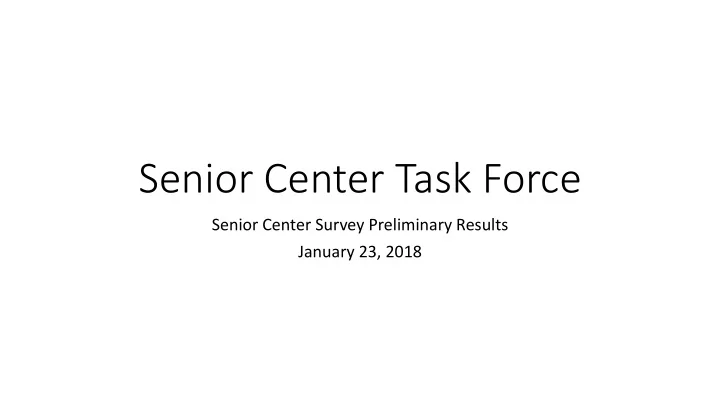

Senior Center Task Force Senior Center Survey Preliminary Results January 23, 2018
About the Survey • Survey sent to all senior centers with valid email addresses using SDA list • Reminder emails sent through SDA weekly email, CASCP, CWCS • 83 surveys returned from around the state.
Average 5,161 people (Range = 144, 000 to 3,000)
Senior centers serve the average of 2129 (Range = 21,000 to 300) people over the age of 60 years old in those towns
Q4: How much funding do you have for training for you and your staff per year? Training Budget The average for the values reported across 83 senior centers is 23 $150.72, of which several noted that these values were also used to cover licensing. The values ranged from $0 (most common response) to $3,000.00 11 8 8 7 6 5 4 4 1 0.00 Under 250 Under 500 Under 750 Under 1000 Under 1250 Under 1500 Under 1750 Under 2000 Over 2000
Center Budgets Center Budgets The average reported budget for the 83 senior centers was $107,846.50. The values reported ranged from $1300.00 to 29 $1.2 million. Several noted that it was difficult to estimate facility costs as buildings were often shared across recreational departments. 18 $23,458375 12 4 3 Under 50,000 Under 250,000 Under 500,000 Under 1 Million Over 1 Million
DAILY ATTENDANCE 19 The average was 125 people. Only 9 centers left this 15 question blank or reported that they did not collect this information. 13 9 8 5 4 UNDE R 50 UNDE R 100 UNDE R 150 UNDE R 200 UNDE R 250 UNDE R 300 OVE R 300
Daily Attendance How many individuals participate in programs, activities and/or services at your Center annually (an unduplicated count)?* Twenty-one centers left this question blank or reported that they do not have this information. Several others provided information that was most likely a duplicated count and that data was discarded. Of those that responded, the average was 1,235 people with a low of 23 and a high of 7,000. Under 50 Under 100 Under 150 Under 200 Under 250 Under 300 Over 300
Most senior centers were open between 9 and 4pm with up to an hour in variance. Only a few included Saturday hours or extended hours into the evening. How many hours per year do volunteers How many volunteers work at your Center contribute?* (an unduplicated count)?* Twenty-four centers left this question blank or reported that they don’t have this information. The average was 55.78 hours. Only 9 centers Of those that did respond, the average was left this question blank or reported that they 2328.76 hours. did not collect this information.
Do you have student intern placements at your Center? From which institutions? If not, why not? Many of the centers have had interns from public and private high schools and colleges/universities. If not, the reasons they did not have an intern included -not being approached or specifically reaching out for an intern. -not having the staff capacity/time to supervise. -not having a licensed professional on staff at center to do the supervision. -no clear town policy. -no workspace available for them at the center.
With regards to training, please answer the following: Are you able to attend offsite training? o 57 respondents said yes, 19 said yes conditionally or sometimes and 6 said no. How far can you travel to attend training? How often could you attend training? Would you access online training? eg. webinars, video tutorials etc. o 82 out of 88 respondents indicated that they would access online training. How far in advance do you need to know about training in order to attend?
Seventy-eight centers responded to this question. The most frequently reported barriers to training were limited time, distance necessary to travel to trainings, and limited staff. Moreover, several of these barriers worked together such that there isn’t enough staff to cover the center for one person to leave for three hours to travel to the training in the next county.
Q14: Over the past few years, what training or professional development have you or your staff engaged in that you found useful? What training was not useful? Please indicate who provided the training. Sixty-five centers responded to this question, listing various trainings. Overall, respondents seemed most interested in very practical, service/resource-oriented training so that they can help their members directly with problem-solving. For example, the CHOICES program, Alzheimer’s Association Conference, and CASCP Training.
Does your community have an appointed Municipal Agent for the Elderly? Of the 82 centers that responded, 96.34% said yes.
Seventy-nine center responded to this question. Several repeated themes emerged as challenges (not in any order): limited staff and space, funding/community support challenges, reaching an age-diverse population, supporting more vulnerable members than ever before (e.g., low income, isolated, mental health issues), and transportation.
Recommend
More recommend